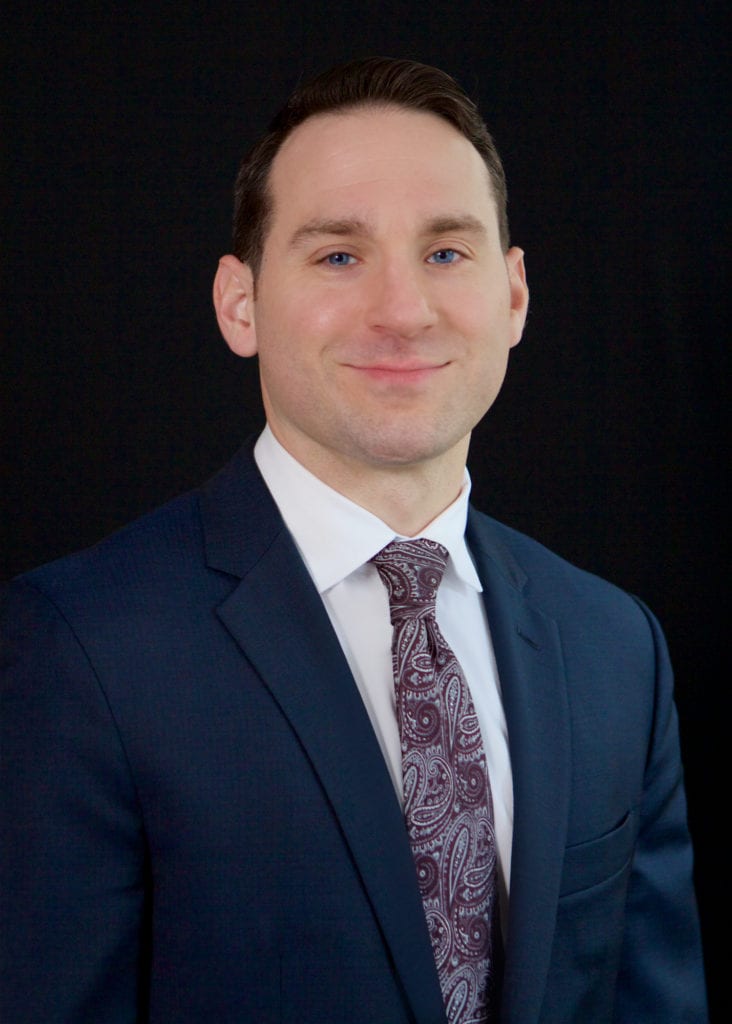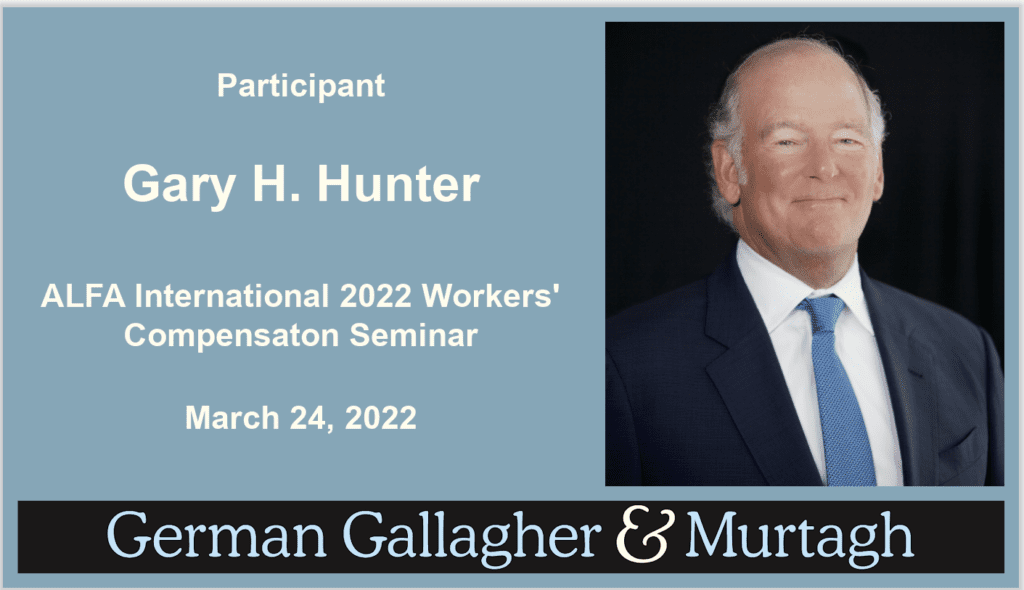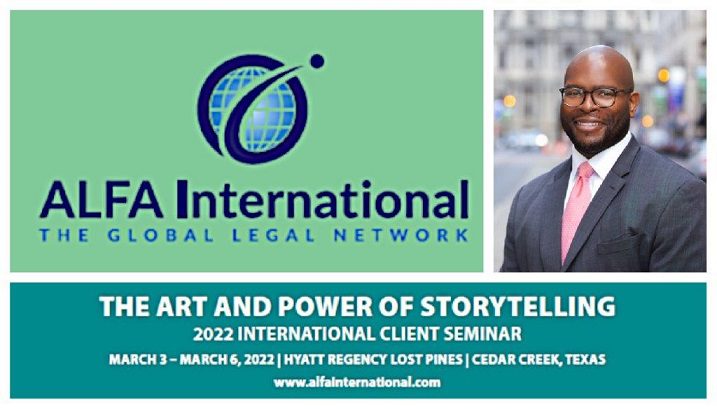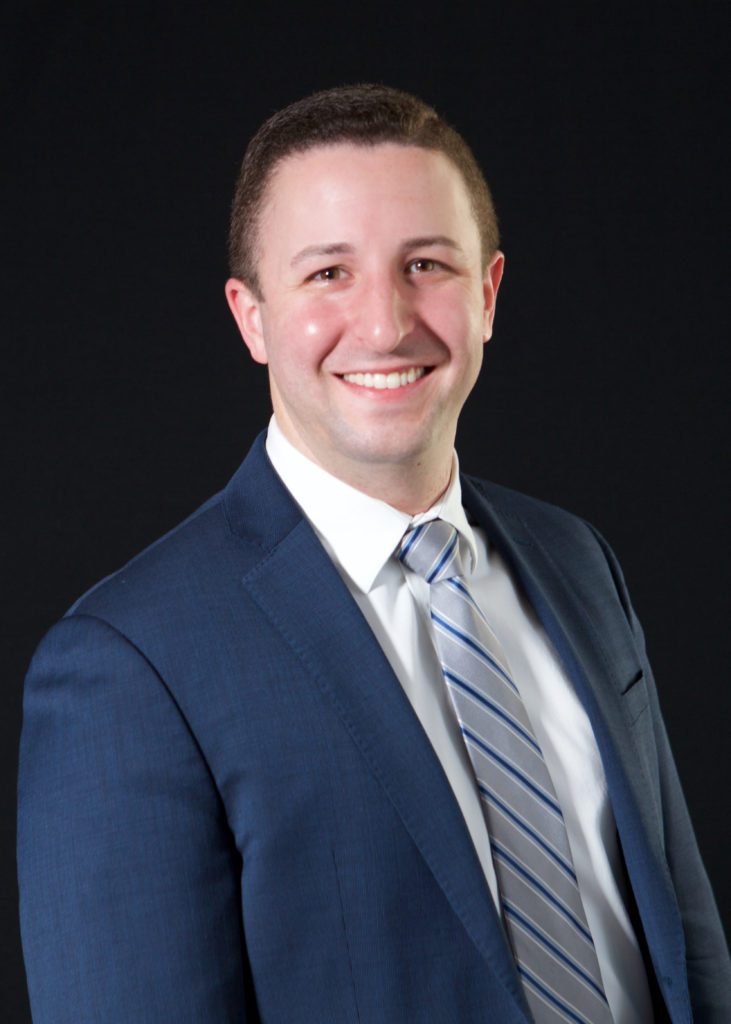
Newsroom
Jeffrey D. Laudenbach will moderate and present at the ALFA International 2022 Workers’ Compensation Seminar.
Jeffrey D. Laudenbach will speak at the ALFA International 2022 Workers’ Compensation Seminar on March 24, 2022. He will moderate a session entitled “COVID-19 Unplugged” and will participate in a roundtable discussion entitled “COVID-19 Best Practices.”
Gary H. Hunter will present at the ALFA International 2022 Workers’ Compensation Seminar.
Gary H. Hunter will speak at the ALFA International 2022 Workers’ Compensation Seminar on March 24, 2022. He will participate in a session entitled “The Evolution of Medicare Compliance and Its Associated Spectrum of Risk.”
More Details Emerge on Workers’ Compensation Court Reopenings in PA and NJ
Although both Pennsylvania and New Jersey have recently loosened their COVID-19 restrictions, the states are taking slightly different paths toward opening their workers’ compensation courts. Courts are continuing to take tentative steps towards full normalization of in-person hearings and other events.
In Pennsylvania, Director Joseph DeRita issued updated guidance on March 2, 2022. That guidance document confirmed that masks are encouraged but no longer required in Commonwealth buildings. The decision to hold in person events such as hearings with testimony or mediations was left largely up to the individual Judge’s discretion. Non-testimonial hearings are encouraged to continue to be held via video conference.
However, where testimony on a contested matter is expected, Judges will have discretion to schedule an in-person hearing where all parties are expected to attend. Parties that object to the decision of the Judge can submit a miscellaneous request via WCAIS stating their reasons for desiring a different form of hearing, either in person or remote. Mediations may also be scheduled in-person at the discretion of the Judge.
In New Jersey, Director and Chief Judge Russell Wojtenko, Jr. issued a memorandum on February 14, 2022 allowing greater leeway in holding in-person hearings at the discretion of individual workers’ compensation Judges. Several Judges have issued their own memorandums outlining their expectations going forward. Most of the Judges in New Jersey who have made their views known have now moved to the default of holding all testimonial hearings in person. This includes settlement hearings, which had typically been done via an affidavit of the Petitioner in lieu of live testimony during the pandemic. This is no longer the default and the courts have gone back the pre-pandemic norm of requiring live testimony and only allowing settlement via affidavit upon a showing of good cause.
As there is a great deal of discretion allowed for in both States’ rules, the transition to regular live hearings may take some time. German Gallagher & Murtagh attorneys expect to move forward with more in-person hearings in the coming months, especially where witness credibility is at stake. Routine and unopposed hearings will likely continue to be held remotely for the next several months. Changes to court procedures are fast-moving and GGM will work to keep clients and the public updated on changes that occur.
Andre J. Webb to present at ALFA International’s 2022 International Client Seminar
This week, partner Andre J. Webb will present in “The Final Act: Closing Argument: Ethos & Ethics” at ALFA International’s 2022 International Client Seminar in Cedar Creek, Texas. The theme of this year’s ICS is The Art and Power of Storytelling. Read more about the presentation below.
“The Final Act: Closing Argument: Ethos & Ethics”
As advocates and counselors, whether we are closing deals or making closing arguments, our job is to persuade clients, mediators, courts, and opposing attorneys and parties. One key to persuasion, according to Aristotle, is Ethos, which means demonstrating character and credibility, or “appealing to ethics.” But surprise, surprise, some stories are lies. Some lawyers can seem credible – and appeal to ethics – even though they (or their clients or experts) are making stuff up. Is that OK? Is it actually part of our job? And whether it is or not, what is the best way to respond? Please help our panel grapple with the enigma of Ethos and ethics in some real- world scenarios.
New Jersey Workers’ Compensation Courts Set to Partially Reopen
Workers’ Compensation Courts appear to be set to partially reopen to live appearances on March 7, 2022. On February 14, 2022, the Honorable Russell Wojtenko, Jr., Director and Chief Judge of Compensation for the State of New Jersey, issued a Notice to the Bar declaring that the Division’s courts will be opened to all case participants going forward.
New Jersey Compensation courts’ reopening is welcome news, but the reopening will not be total immediately. A significant number of cases will still be heard via teleconference. Chief Judge Wojtneko’s directive outlines that routine and uncontested matters, such as pre-trial conferences, list markings, uncontested motions, and settlement approvals, can still be accomplished without an in-person appearance by the parties or their attorneys.
However, it appears that contested matters, witness testimony, and trial appearances will now be going forward in an in-person setting. Further, holding remote hearings will require the consent of both parties. But it is likely that as COVID-19 restrictions ease further, parties will be required to appear for more in-person events. It is expected that settlement hearings will eventually have to be conducted with primarily in-person testimony rather than by affidavit, which has been the norm during the pandemic. Limited health screenings of attendees, such as taking a temperature and screening for symptoms, may also be required. Still, further, individual judges’ directives will also impact how quickly separate courtrooms and vicinages open up to in-person events.
Notice to the Bar – Workers Compensation – Reopening Courthouses_- 02/14/22
Admissions of Agency: Pennsylvania Trucking Defense Gains Instructive Momentum

A recent trend in Pennsylvania trucking litigation has led to the early dismissal of corporate defendants. The article linked here discusses how a defendant-employer admitting that a defendant-employee was acting within the scope of its duties at the time of an accident can lead to the dismissal of direct negligence claims against the defendant employer as early as the pleadings stage.
GGM is pleased to announce that Matthew J. McColgan has been named a Partner of the Firm
 German Gallagher & Murtagh is pleased to announce Matthew McColgan as our firm’s newest partner. Matt has been a valuable member of the firm’s Transportation group since he joined the firm in April 2017. He also handles premises liability and casualty matters. Matt has earned this promotion by consistently proving his commitment to excellent client service, his everyday drive and work ethic and his constant efforts to be the best attorney he can be, all while upholding the firm’s values both inside and outside of the office. Matt received his JD from Widener University and his Bachelor of Arts in Philosophy: Pre-Law from Temple University. German Gallagher & Murtagh is proud to have Matt on our team.
German Gallagher & Murtagh is pleased to announce Matthew McColgan as our firm’s newest partner. Matt has been a valuable member of the firm’s Transportation group since he joined the firm in April 2017. He also handles premises liability and casualty matters. Matt has earned this promotion by consistently proving his commitment to excellent client service, his everyday drive and work ethic and his constant efforts to be the best attorney he can be, all while upholding the firm’s values both inside and outside of the office. Matt received his JD from Widener University and his Bachelor of Arts in Philosophy: Pre-Law from Temple University. German Gallagher & Murtagh is proud to have Matt on our team.
An Inconvenient Forum: GGM Secures Dismissal of Crashworthiness Case filed in Philadelphia County
Attorneys Jacqueline Campbell and Matthew McColgan secured the dismissal of a national truck rental company in product liability action filed in the Philadelphia County Court of Common Pleas. The plaintiff alleged that the truck rented by his employer was not crashworthy, because it lacked an airbag mounted on the steering wheel. Although GGM’s client is headquartered in Pennsylvania, the accident occurred outside of Pennsylvania and involved an out-of-state plaintiff with little connection to Pennsylvania.
Shortly after the pleadings closed, Campbell and McColgan moved to dismiss the case, arguing that Pennsylvania was an inconvenient forum. Pursuant to 42 Pa. C.S.A. § 5322(e), “[w]hen a tribunal finds that in the interest of substantial justice the matter should be heard in another forum, the tribunal may stay or dismiss the matter in whole or in part on any conditions that may be just.” Hovatter v. CSX Transportation, Inc., 193 A.3d 420, 424 (Pa. Super. 2018). In making this determination, the Court considers the weighty reasons to justify disturbing the plaintiff’s chosen forum, including an analysis of both public and private interest factors. The plaintiff tried to argue that the decisions related to the purchase of the truck occurred in Pennsylvania; however, the facts revealed during venue discovery did not support his theory. Ultimately, the Court agreed with our argument that a company’s marginally-related business activity in Pennsylvania was an insufficient basis to warrant continued venue in Philadelphia County when most of the relevant witnesses are located outside of Pennsylvania.
PA Supreme Court Rules Jurisdiction-by-Registration Statute Unconstitutional
Registering to do business in Pennsylvania no longer establishes general personal jurisdiction according to the Pennsylvania Supreme Court’s landmark decision in Mallory v. Norfolk Southern Railway Co., 3 EAP 2021, 2021 WL 6067172, —A.3d — (Pa. Dec. 22, 2021). Prior to this decision, foreign corporations were subject to general personal jurisdiction in Pennsylvania by registering to do business, which is mandatory under Pennsylvania law. With this ruling, a company can no longer be sued in Pennsylvania for out-of-state conduct simply because it registered to do business in Pennsylvania.
In Mallory, a Virginia resident filed an action in the Philadelphia County Court of Common Pleas against a Virginia railway corporation that has a principal place of business in Virginia. The plaintiff alleged exposure to carcinogens while working for the railway in Ohio and Virginia; he did not allege exposure in Pennsylvania. The railway filed a preliminary objection, asking the trial court to dismiss the case for lack of personal jurisdiction. The plaintiff argued that the railway consented to general jurisdiction by registering to do business in Pennsylvania. The trial court sustained the objection, finding Pennsylvania’s long-arm jurisdiction statute unconstitutional and insufficient ties to establish specific personal jurisdiction over the railway.
Pennsylvania’s long-arm jurisdiction statute provides that general personal jurisdiction can be established by “incorporation under or qualification as a foreign corporation under” Pennsylvania state law. 42 Pa.C.S. § 5301(a)(2)(i). Additionally, Pennsylvania’s Associations Code requires foreign corporations to register before doing business in the state. 15 Pa.C.S. § 411(a). Construing § 5301 and § 411 together, the trial court reasoned, would mean that foreign corporations are required to submit to general jurisdiction as a condition of doing business in Pennsylvania. Recognizing the federal limits placed on a state’s ability to regulate a foreign corporation’s actions, the trial court found that this “Hobson’s choice violates Defendant’s right to due process.” Also, the trial court found that registration was an involuntary act; therefore, foreign corporations did not voluntarily consent to jurisdiction when registering with the state.
The Pennsylvania Supreme Court affirmed the order of the trial court. General jurisdiction under the Due Process Clause of the Fourteenth Amendment is only permissible over a corporation where it is regarded as at home, such as its place of incorporation or principal place of business. Goodyear Dunlop Tires Operations, S.A. v. Brown, 564 U.S. 915 (2011) General jurisdiction is also proper where a corporation’s affiliations with a forum state, when compared to a corporation’s activities in their entirety, are so continuous and systemic it is essentially “at home” in the forum state. Daimler AG v. Bauman, 571 U.S. 117 (2014). Importantly, a corporation is not “at home” merely because it does business in a state. Id. at 139 n.20.
Applying Goodyear and Daimler, the Pennsylvania Supreme Court found, “to conclude that registering as a foreign corporation invokes all-purpose general jurisdiction” violates federal Due Process. Registration is a prerequisite to a foreign corporation merely conducting business in Pennsylvania and operation within Pennsylvania cannot be the basis of general jurisdiction alone. Also, the Court found that Pennsylvania’s statutory scheme of submission to general jurisdiction as a condition of doing business in states violates the principles of federalism. Pennsylvania has no legitimate interest in adjudicating a controversy with no connection to the state filed by a non-resident against a foreign corporation.
Finally, the Pennsylvania Supreme Court found that, because registration in Pennsylvania is mandatory, it cannot constitute voluntary consent. Additionally, the government may not grant a privilege predicated upon the surrender of a constitutional right. See, Koontz v. St. Johns River Water Mgmt. Dist., 570 U.S. 595, 604 (2013). For these reasons, Pennsylvania’s statutory scheme cannot support a constitutional waiver of general jurisdiction of consent by registration. As a result, the Court overturned the decision in Webb-Benjamin, LLC v. Int’l Rug Grp., LLC, 192 A.3d 1133 (Pa. Super. 2018) (holding that registration was insufficient to establish general jurisdiction but consent by registration remained possible in Pennsylvania).
Pennsylvania courts may still exercise general personal jurisdiction over companies deemed “at home” in Pennsylvania, or specific personal jurisdiction over foreign companies based on conduct within the state. However, foreign companies no longer surrender the constitutional right to due process merely by registering to do business in Pennsylvania.
The Pennsylvania Supreme Court’s opinion can be found here.
GGM is proud to welcome Fran Bovio to our Litigation Team!
Francis “Fran” Bovio joined our GGM team on Monday, December 13 as an Associate. Fran comes to us from a civil litigation firm where he defended parties in a wide range of matters, including premises liability, nursing home liability, and asbestos litigation matters.
His prior experience includes working at a plaintiff’s litigation firm. Fran also interned for the Honorable Michael A. Shipp and was a Legal Intern for the Philadelphia DA’s office and the US Department of Justice.








